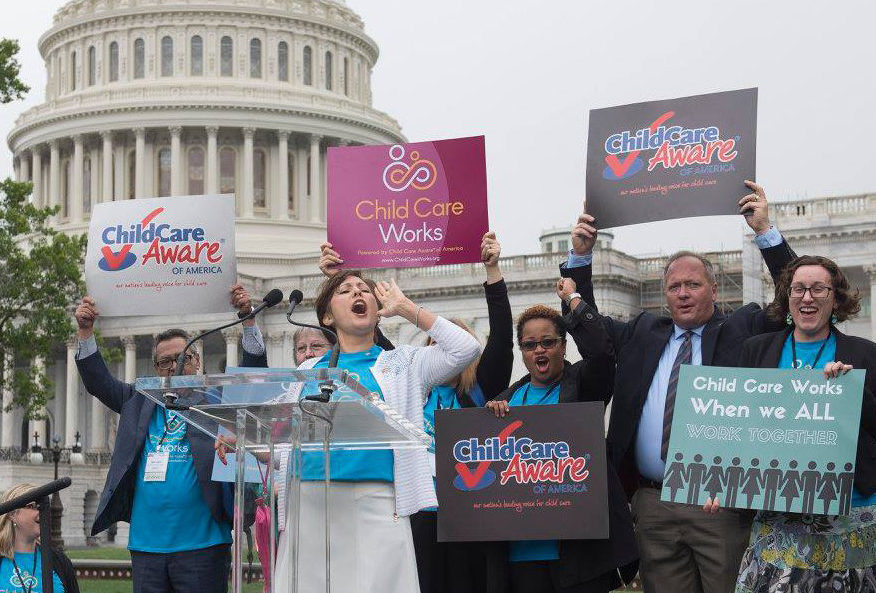Rising Childcare Costs Reflect a Need for Change
RALLY FOR CHANGE: Speakers at an affordable child care rally at the U.S. capitol in Washington, D.C.
Childcare: one of the most significant financial burdens for new parents. A recent study conducted by Penny Hoarder, reported on by Fox Business, found that 44% of parents are paying $1,000 or more in childcare every month. For half of parents surveyed, they were spending at least 25% of their total income on childcare. This is a significant increase from 2018 when the median percentage of income spent on childcare was 15% of the parents’ overall income.
Moreover, parents are having to make significant sacrifices in order to meet childcare costs. Four out of ten parents reported going into debt to afford childcare. Nearly one out of five parents said they’ve had to quit their job because of the costs of childcare.
These sacrifices, beyond their immediate drawbacks, can have long-term negative effects on the family. Stay-at-home parents often have a difficult time returning to the workforce after a gap of employment. At the very least, they have to sacrifice opportunities for advancement and continual benefits which can put the family into a worse-off financial place in the future. This can grow the inequality gap between families that may be able to afford childcare and those who cannot.
Childcare is also incredibly different across different situations. Each state has its own childcare policies, such that childcare funding varies in amount, source and requirement depending on where you live. Despite its vast importance, childcare is incredibly inequitable across different economic situations. Child Care Aware of America reports families of color, families in rural areas and families with children with special needs are less likely to have access to quality childcare. Additionally, when the parenting situation is a man and a woman, the woman is much more likely to leave their job and sacrifice their career.
COVID-19 further complicates the issue. What was already a broken system is now struggling to reopen to its too-limited capacity and parents are facing serious challenges in finding childcare as they have to return to work. The US Chamber of Commerce Foundation found that during the pandemic 32% of employers have seen employees leave due to childcare-related reasons and 60% of parents will need to change their current childcare situation in order to fully return to the workforce.
So what can we do about it?
Well, first thing’s first: recognize it as an important issue that needs to be legislated. Typically, Republicans tend to argue for less government involvement in childcare for both financial and social reasons while Democrats argue for more government involvement in childcare.
Regardless of party lines, research, including that cited above, proves that this is not an issue that can be fixed on an individual basis. If left to fester, we will likely see a multigenerational increase in inequality with severe impacts on American productivity, quality of life, and child development. Moreover, the benefits that government-assisted or provided childcare could have on American society far outweigh the costs.
The Economic Policy Institute outlines the benefits that government investments in childcare could have on American children, families, society and economy. Benefits extend directly to child development, increased resources to families with children, parents’ increased labor force participation, and the professionalization of the childcare workforce.
Every child, regardless of their situation, deserves nurturing and enriching experiences that contribute to their healthy development into happy and thriving adults. We, and by extension the government, have a responsibility to try our best to ensure that this right is assured.
Policy efforts to address having accessible and good childcare is ongoing, and because of the game of politics it is not straightforward. The intention of this article is not to propose a specific solution, but rather the active effort and attention to finding a solution. I encourage everyone to be actively aware of how your civic engagement can and does affect childcare policy. Beyond the act of voting, I encourage everyone to just be aware of the importance of civic engagement because of issues like childcare. Your vote, your voice, matters.
Whether you intend to be a parent or involved in a child’s life in some way, this is an issue that concerns all of us and is instrumental in helping resolve systematic inequality in the United States. It’s a women’s issue, a societal issue, an economic issue, a family issue and much more. We all have a stake and a responsibility to be more conversant and participant in helping improve childcare.
It takes a village, even if that village is beyond the conventional definition.

Elli Ament is a senior from Littleton, CO concentrating in history with a focus on cultural history and media. She has previously served as a Commentary...





